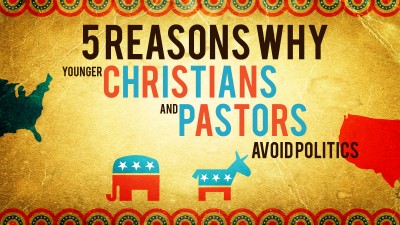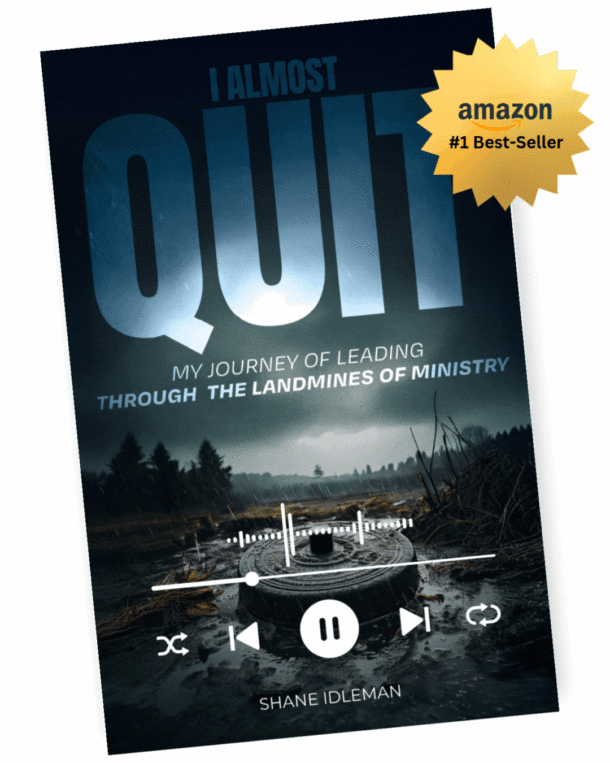In my opinion, failure to recognize diverse gifts may explain why many people are divided on the issue of religion and politics. For instance, John MacArthur, James Dobson, Chuck Colson, Tony Perkins, Jim Garlow, and D. James Kennedy have/had different ministries, but all fall under the umbrella of Christian service. God creates, within each of us, varying desires, talents, and levels of interests. If God has called a man to preach and teach His Word, that will be his passion. If God has called a Christian to pursue politics, that will be his or her passion, and so on.
Problems arise when we become judgmental and fail to respect our differences. Activists should not expect everyone to share their passion for politics, and those who believe Christians should stay out of politics must understand that God clearly calls some Christians to the political arena. God established the concept of government, why would He not desire godly leadership?
The top five comments I’ve heard that prevent involvement are:
1. The Moral Majority (1980s) forever linked the church to the Republican Party.
We vote for principles, not a particular party. We need to be principle driven rather than party driven. “He who rules over men must be just” (2 Samuel 23:3). We need more humble, God-fearing leaders. The Lord hates pride, arrogance, and self-centeredness. Without humility and a teachable spirit, it’s difficult, if not impossible, to govern properly. Humility does not mean that leaders become passive pawns, but that they live in total surrender to God; they’re more concerned with God’s opinion than opinion polls. It’s been said that the quality of our government depends more upon the character of our leaders than upon our laws. But be careful—many use “religious talk” and twist the Scriptures to support un-biblical initiatives. Judge what they “do” more than what they “say.”
2. Christians are “always against something.” They vilify just abortion and gay-marriage.
Christians are not magnifying certain issues at the expense of others; we are underscoring the enormous importance of them. All issues cannot be equal. If everything is a priority then nothing is.
Those who are bold and strongly contend for biblical truths are often seen as “always against something.” But if we’re for marriage between a man and a woman, then we must be against gay-marriage. If we’re for the sanctity of life, then we must be against abortion. If we’re for equality, then we must be against the slave/sex trade, and so on. Speaking the truth in love often results in being “against” some controversial things. This can’t be prevented, nor should it be. We are called to make the truth popular but to make it clear.
We must contend for foundational issues: “If the foundations are destroyed, what can the righteous do?” (Psalm 11:3).
3. Politics is bad, offensive, and divisive.
We cannot gauge what we say by whether or not it’s offensive. The laws of a nation establish the foundation. The government cannot remain neutral, or separate, from the foundation on which it rests. Granted, many governments, including our own, often fall short; that’s why we should strive to be on God’s side rather than always assuming that He is on ours. God ordained the institution of government, but He does not approve of every form of government.
We don’t have to abandon our ethics or compromise our principles to be involved in politics—what good is salt left in the shaker, or a light that is hidden? “Politics” is not a bad word. In simple terms, politics refers to governing or leading a group of people. Politics won’t save America, but in order to implement change, honor God,and help others, we must take action; hence the political process.
We cannot change a person’s heart by forcing a set of laws or rules upon them, but we can restrain evil and deter wrongdoing. To suggest that God does not want us to elect godly leaders and promote godly legislation runs contrary to His nature (cf. Romans 13).
4. The church and the state are to be separate.
The Courts have used the infamous “separation” phrase to ban religious activities, primarily those promoting Christian principles. Sadly, many believe that “separation of church and state” appears in the Constitution, when, in reality, the phrase does not appear anywhere in the Constitution. Be very clear on this point, especially if you are a student in a public school or university, or even a “Christian” university.
Thomas Jefferson, author of the Declaration of Independence, used the phrase in 1802 in a private letter written to the Baptist Association of Danbury, Connecticut.
The Baptists feared that the government might someday try to regulate religious expression. Ironically, we are seeing this today. This is crucial in understanding the spirit in which the First Amendment was written. In other words, the Colonists, like the Pilgrims, did not want the government imposing a national religion or denomination on the people—they wanted to worship freely. Mr. Jefferson wisely agreed with them, as did many of the other Founders. His statement was intended to protect religious expression by building a wall of separation between the church and the state; solidifying the fact that the federal government could not strike down religious freedoms.
The government cannot establish a national religion, but it can openly and unapologetically acknowledge the sovereign hand of God. Acknowledgment is not establishment.
5. The Gospel doesn’t allow for politics…it’s not our mission.
The No. 1 problem in America is not a political problem, but rather a spiritual problem called sin. The primary goal of the church is not to become a political movement, but a spiritual influence. Politics won’t save America anymore than a dumbbell will save someone drowning. Nevertheless, we cannot ignore our God-given civic responsibility and the enormous impact that politics has on our society. America’s leaders play a big role in shaping the direction of the Country.
God’s Word says to confront, confess, and turn from sin—political hot buttons cannot be avoided. Many argue, “We shouldn’t say or do anything political. All we need to do is preach the gospel.” Be careful here, although the gospel is our primary focus, this shouldn’t be an excuse against action. God has blessed and sustained America because of our spiritual foundation. Should we now neglect it?
Why would God ordain a government such as ours in America and not ask us to be involved? Although my primary calling is preaching, I thank God for Christians who are involved and who influence America’s political climate. I wish that there were more. As the moral and cultural war rages between our shores, the need to be awakened from our spiritual slumber has never been greater. “Where the battle rages, there the loyalty of the soldier is tested” (Martin Luther). This battle is for the very soul of our nation. It’s our choice—stand or fall.


